What is Search Generative Experience (SGE)?
On May 10, 2023, Google launched a limited beta version of an AI feature on its search tool. This feature, like an "AI chatbot", is already known as the "Search Generative Experience" (SGE). 🤖
It's an experimental tool that uses generative artificial intelligence to provide users with clear and fast answers, without needing to click on individual web pages.
Like other AI-powered search engines, SGE uses the same type of technology as ChatGPT to answer a request in a conversational way, with suggested sources for more information, follow-up questions, and sometimes other features (for example, a product gallery for shopping).
These answers don't replace traditional search results. They are displayed above them. Users can still scroll down to display the search enngine results page (SERP) they are used to.
SGE also enables users to generate text and images based on AI. You can enter a prompt, like in ChatGPT (a prompt that matches a request), and you will get the result directly in your search page.
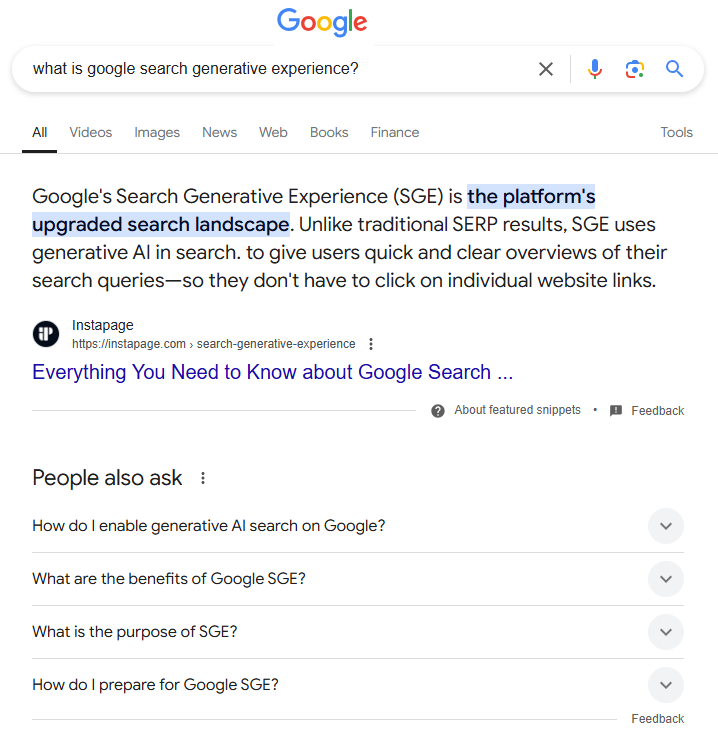
What will SGE be used for?
SGE can be useful for different tasks such as:
- finding quick and illustrated answers,
- summarizing the main points to remember,
- getting useful instructions.
How to activate SGE?
To use SGE, you must have the following elements:
- a Chrome browser,
- a Google account,
- be 18 or older,
- live in one of over 120 countries where the service is available.

What does SGE look like in the Google results pages?
In general, when SGE is enabled for a request, results are displayed at the top of a page, with a button that allows AI to generate a response.
Here are the elements you will see:
- a textual response generated by artificial intelligence,
- a selected website gallery with more information about the topic,
- an icon to access detailed sources. By clicking on it, the generated text becomes rich with additional web sources for some sections or points,
- the tracking option allows you to ask follow-up questions about your request,
-
additional question suggestions.
How does Search Engine Experience work?
To understand what the generative experience of Google Search is, first, you must know what generative AI is.
To put it simply, generative AI refers to algorithms that are capable of creating content, including text, images, audio, and code.
Generative AI systems rely on large language models (LLM), which are created from large quantities of data. Other technologies like natural language processing, machine learning, deep learning, and knowledge graphs are also used.
This enables search engines to better understand users' requests and provide an accurate response.
Advantages of Google's generative AI research
The integration of AI in Google will transform the way we make online research.
Here are the main advantages...
Basic presentation of complex subjects
SGE will give an easy-to-understand summary of complex subjects, allowing internet users to grasp the main points without being overwhelmed by details.
It also offers a more interactive experience than traditional search. Google suggests related questions and additional relevant queries to help users access in-depth information in just a few clicks.
Quick and direct responses
SGE streamlines the process of data collection, allowing users to find what they are looking for directly. It's easier and faster than browsing through different websites.
A search can also give a response in the form of an image.
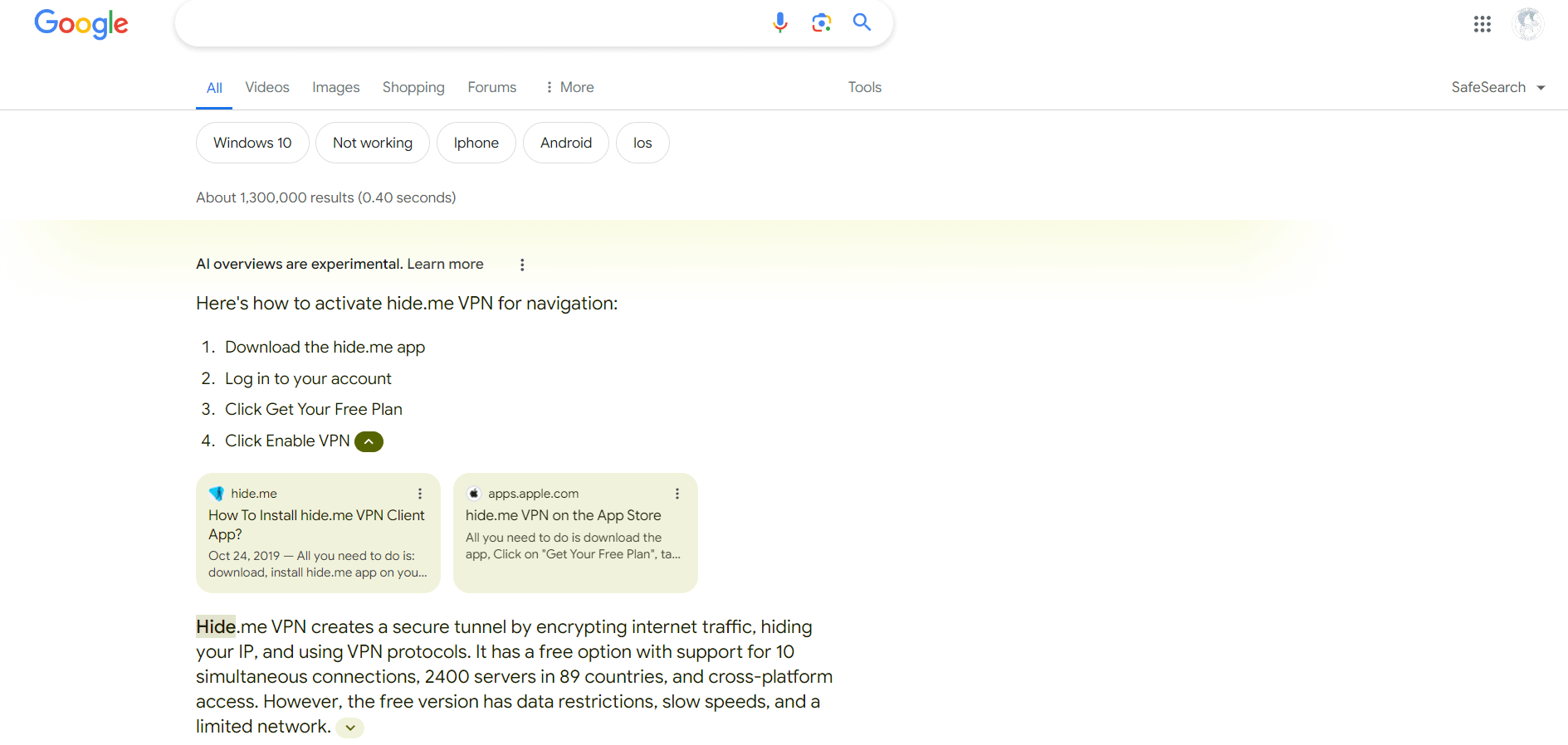
Potential disadvantages of SGE
The attraction and potential of Google's AI search are obvious, but it's important to remember some limitations...
Geographic limitations
For now, Google SGE is available in 7 languages and over 120 countries, but it hasn't been launched in certain European regions yet.
Risk of inaccuracy
This is just the beginning of Google's new AI search feature. Language models can sometimes dazzle and provide false information.
That's why SGE displays the following warning: "Generative AI is experimental. The quality of information can vary.".
This warning is especially important for topics like finance, security, or health (which fall under the "Your Money or Your Life - YMYL" tag).
Less visibility for paid search
Google ads are the main income source for many businesses. So, Google must be careful to ensure that SGE doesn't disrupt this system.
That being said, we will likely see generative AI ads in the future. Google is also experimenting with new ad formats.
Lack of transparency
Google provides limited information about AI used by its search engine.
This lack of transparency goes against users' desire to understand how artificial intelligence arrives at a specific conclusion.
Google SGE vs ChatGPT
At first glance, ChatGPT and Google SGE seem to have the same objective: answering users' questions.
However, these artificial intelligence tools are different.
ChatGPT is more conversational and has been trained to imitate human language. It's like talking to an expert or a virtual assistant.
This makes ChatGPT the best choice for complex and collaborative tasks such as AI copywriting, communication automation, or AI marketing.
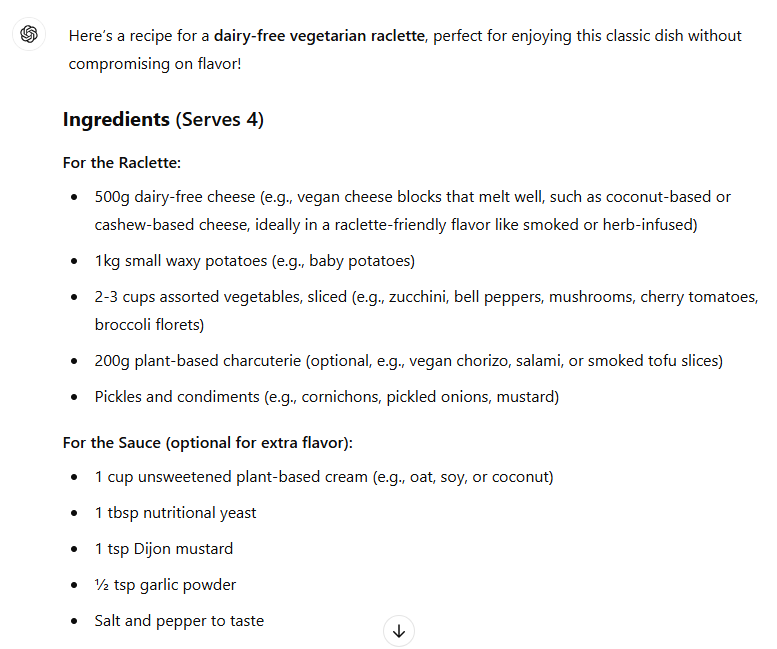
Google SGE, on the other hand, is better suited for answering specific questions and providing factual information, like "How do we make homemade bread?" or "Who won the last football World Cup?"
Google SGE vs Bing
In February 2023, Microsoft integrated an AI chatbot into Bing, using ChatGPT technology to create custom responses to requests.
For example, if you ask about the lastest design trends for this year, Bing's AI will provide you with a detailed list in response.It also includes some websites as references to credit the sources of information.
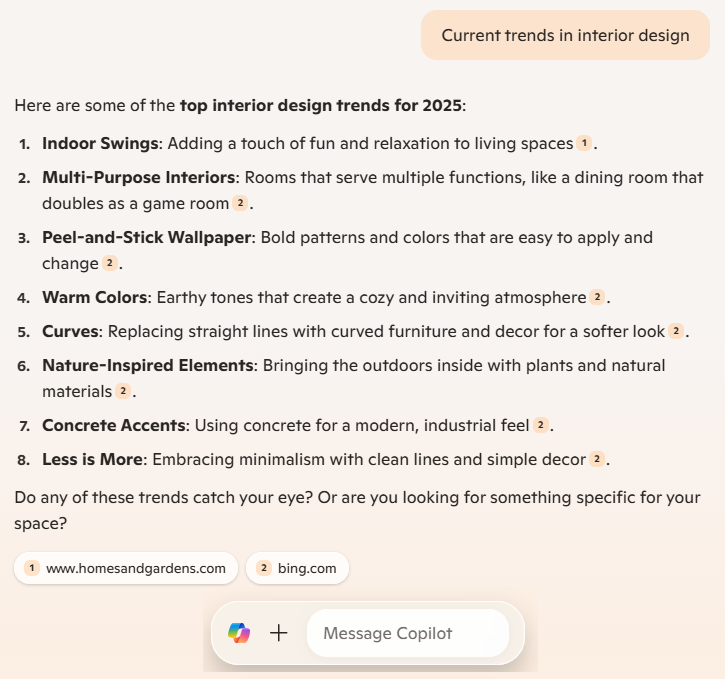
Like Google, Bing suggests additional questions.
One of the main advantages of Bing is that its AI search is already available to all users worldwide. 🗺️
In most other respects, both tools are quite similar.
What impact will AI search have on SEO?
Generative AI has both positive and negative implications for SEO. While it may reduce organic traffic, it can also attract potential customers who are more likely to convert.
How AI online search can damage your website traffic?
If users get most of the information they need from AI-generated summaries, it could discourage them from clicking on websites, including yours.
Google still mentions web pages as sources, but the value of a high ranking for "what" queries is likely to decrease.
How can AI search attract more qualified potential customers to your website?
Let's look at how SGE could attract more qualified, potential customers to your website...
While website traffic may decrease, especially for basic requests, many users will still need to perform deeper searches.
Good news! When someone finally visits your website, they will likely be well-informed and more ready to engage or convert.
It's also important to remember that Google won't delete traditional results; they will still be available below the AI-generated response.
Moreover, initially, SGE will just be an option that users can activate.
Common criticisms and fears about SGE
Disappointing results
The most common criticism of SGE is that many responses are disappointing.
In most cases, it's just a checklist without details. By asking an additional question, users may get more information, but nothing that could be considered expert-level.
No analysis follow-up
Many specialists worry about knowing if Google will share data about SGE, especially impressions and clicks.
This fear seems justified since the search engine has always been reluctant to give this type of information on other features of SERPs. 🤫
Less clicks
Although Google will continue to include clickable links to websites related to the request, just a few of them are really visible.
You have to scroll down to move the gallery or click the button "Detailed sources" for more information...
Moreover, the way these websites are selected is not clear. They often correspond to the best-ranked results in SERPs for the request, but it isn't always the case. It seems that SGE uses its own algorithm to choose the recommended sources.
Plagiarism
The most virulent criticism against the SGE feature concerns the fact that AI often uses full text passages directly from websites.
Some people talk about content theft and plagiarism.
How to optimize your SEO for the generative AI of Google Search?
Here are the steps to follow to optimize your website according to the new Google search...
How to prepare for the SGE arrival? Use E-E-A-T and organic SEO
If you have succeeded in boosting your organic traffic regularly for some time, you are probably in a good position for the SGE arrival.
You may already be doing what is necessary to be displayed in results, especially if you try to favor E-E-A-T (Experience, Expertise, Authority, Trust).
Moreover, ranking high in organic results will always be important. As with featured snippets, even when a SGE response is present, many users will want to browse normal results to get information or a confirmation.
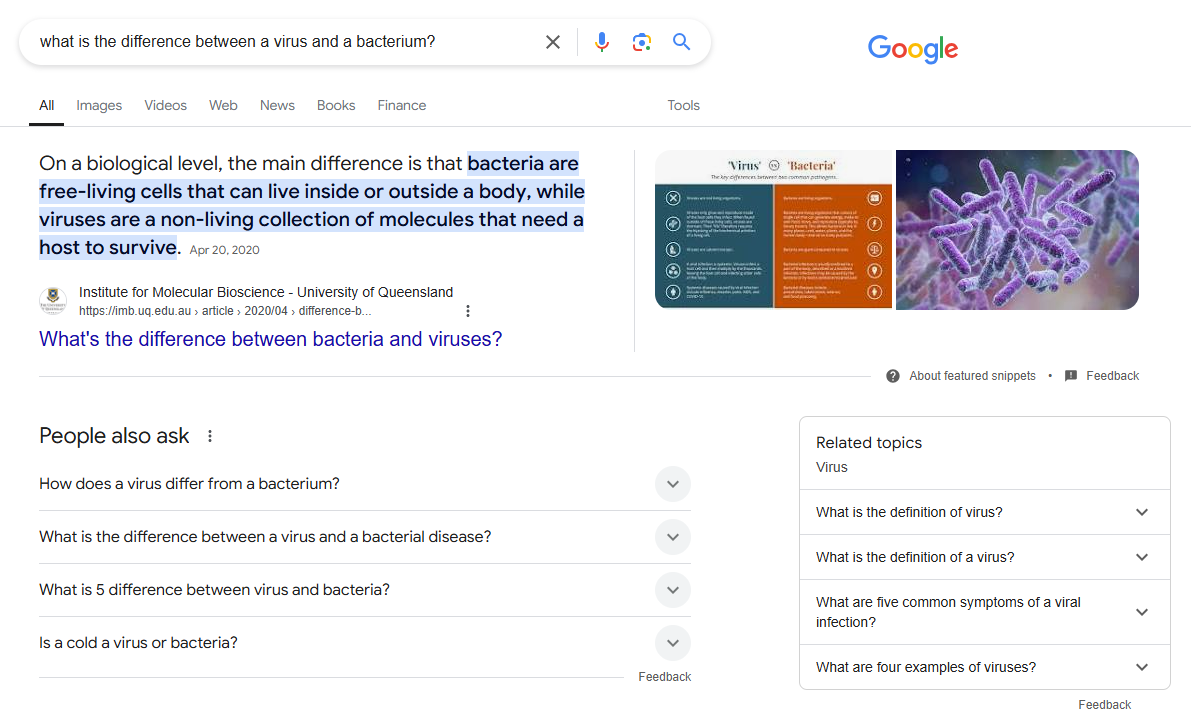
Exploit long-tail keywords
Initial results show that the generative AI encourages users to search with more detailed requests rather than short sentences. So, try to optimize your content for long-tail keywords.
For example, instead of "summer dresses", you could target the long-tail keyword "summer dresses in cotton with floral prints". 👗

Create quality content in accordance with search intent
Like traditional search, SGE prioritizes the creation of relevant and useful content, but aims to make the global experience faster and easier.
One of the best ways to create high-quality web content that Google chooses consists in using reliable sources, sharing expert opinions, and ensuring that all the displayed information is accurate.
It's essential to understand and take search intent into consideration (the reason why a user make a search).
There are 4 main types of intentions:
-
Navigational intent: Users are looking for a specific page (e.g., they want to sign in to Airbnb).
-
Informational intent: Internet users want to learn more about something (e.g., "accommodation solutions to travel in Italy"). 🏨
-
Business intent: They are searching before making a purchase decision (e.g., "Finding cheap accommodation in Italy").
-
Transactional intent: They want to make a specific action, such as making a purchase (e.g., "Booking an online accomodation in Naples").
Once you have chosen your keywords and identified the search intent, review the results page and ask yourself:
- What makes the first results the best?
- How in-depth is the information they present?
- How to create even higher-quality content?
For instance, you could give more examples than your competitors for the targeted keywords to make a difference. You could also give step-by-step instructions if users are trying to complete a task.
Give priority to natural language
Google SGE includes everyday language, so you can - and should - talk like your audience.
This is particularly effective for voice search.
This means you must avoid using overly formal language. Instead, focus on simpler and more concrete formulations.
Implement structured data
Structured data (also known as "schema markup") refers to a coding standard that helps search engines understand and classify online content.
Using this markup makes your content more readable for search engines and enables your pages to be displayed in more relevant searches. This can also improve your SEO performance over time.
Search engine experience and e-commerce
First, when a request has a clear commercial intention, Google SGE places a shopping gallery at the top of the page. 🛒
Links to products in the generated response are unique, and don't perfectly match Google's spondored or natural purchase results.
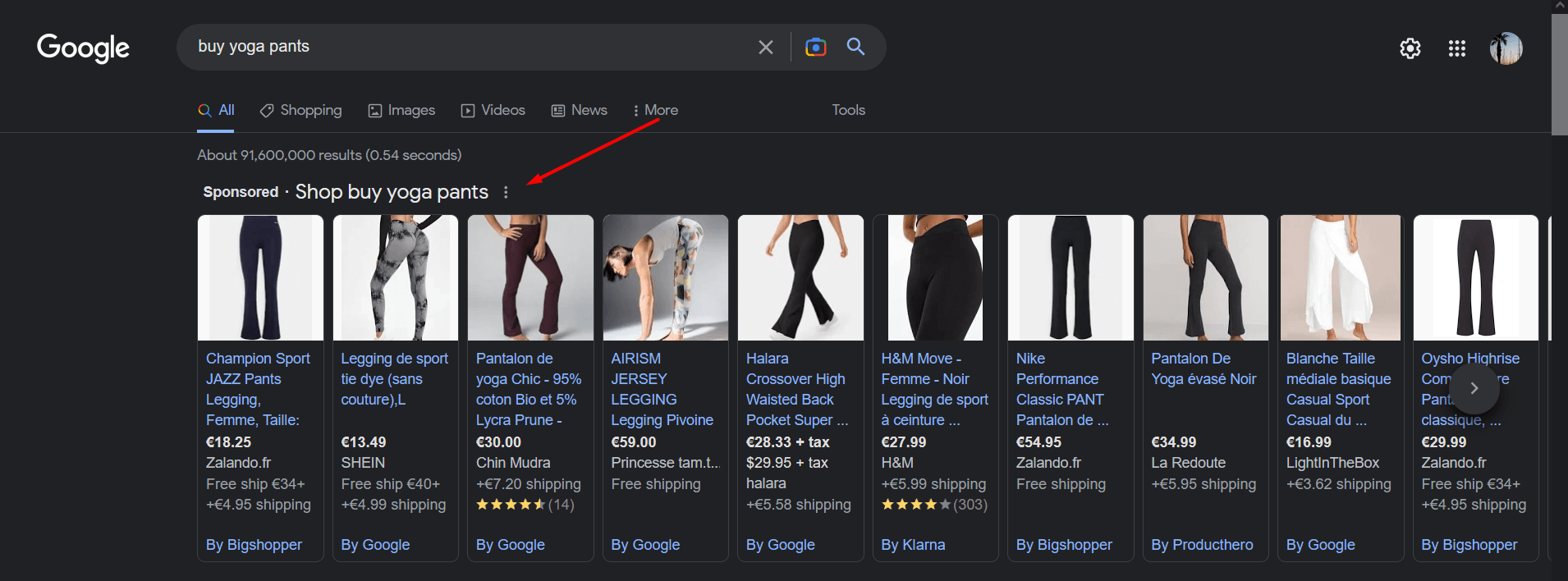
However, unlike traditional product lists, these suggested products aren't tied to a specific retailer. Quite the opposite! When you click on one of them, a side panel opens with additional filters and multiple purchase options.
Conclusion: Prepare for the SEO future with Google SGE
The AI-generated responses of Google SGE bring significant changes, and there are still many questions.
However, one thing is a certain: we will experience shifts in how internet users search for and find online information.
What's the best thing to do now? Continue optimizing your website, monitoring and improving your Google ranking, and focus on creating useful content in natural language that addresses search intentions. 💪








